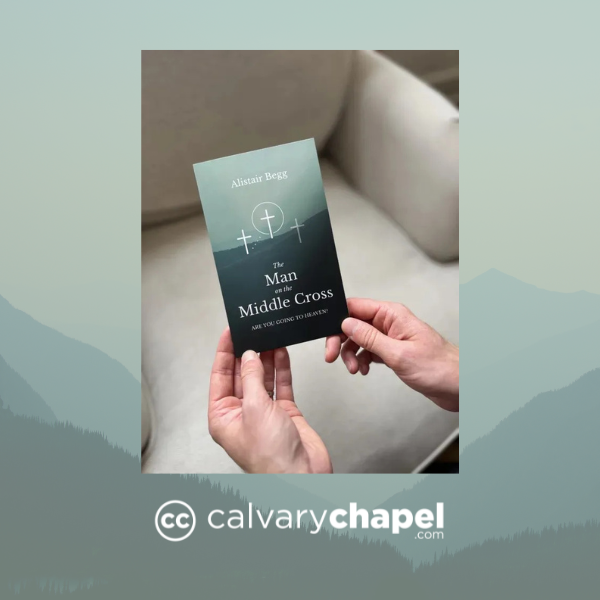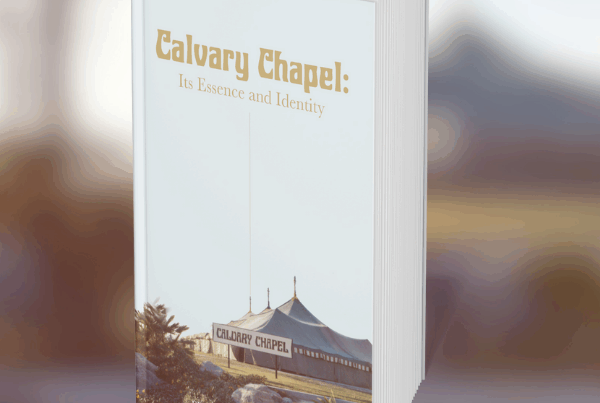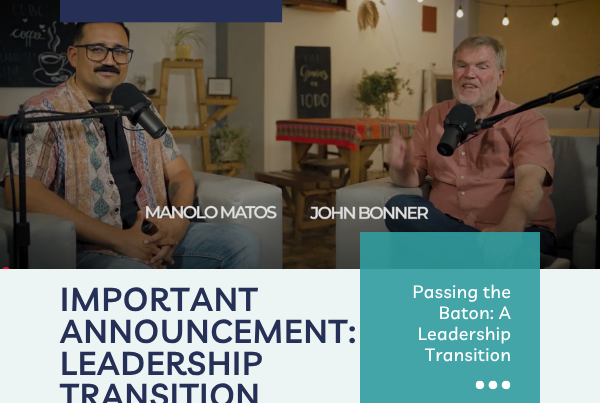
We are excited to share this excerpt from The Man on the Middle Cross by Alistair Begg—a book that beautifully unpacks the heart of the gospel and the hope we have in Christ. We are grateful to our friends at 10ofthose.com for making this resource available and for their mission of distributing books that point people to Jesus.
We hope this glimpse into the book stirs your heart to dig deeper, and that you will grab a copy for yourself (and maybe a few to give away).
It all started as a bit of fun. A DNA test. If she was honest, she was hoping it would help her understand herself better, help her feel connected to something bigger, fill a space she couldn’t quite define. She’d always been curious about her ancestry, wondering whether those family rumors about a distant Italian relative were true. Perhaps knowing more about where she came from would help fill the nagging sense that something was missing. She didn’t send it off straightaway. She kept putting it off, saying she wasn’t sure about it all. But one day, she decided she had nothing to lose. She was even quite excited to find out.
But when the results arrived, the excitement gave way to something else. First confusion. Then disbelief. Then to something deeper, something shifting and unsteady—something she couldn’t quite describe.
Her father wasn’t her father.
The reality settled like a stone in her chest. She double-checked the results, searched online for explanations, scoured the paperwork. But there was no mistake. The evidence was there in black and white.
She thought back over her childhood, replaying conversations, family holidays, Christmas dinners. Had she missed something? Had everyone else known? The questions churned inside her, but she told no one. Certainly not her mother. Not her sister or her daughter or even her closest friend.
What did it all mean? She carried the secret alone, like an invisible wound. Some days, it barely stung. Other days, it ached so deeply she could hardly breathe. She felt so alone, so disconnected—and even further from the sense of wholeness she had longed for.
She wasn’t the first to search for something more. Centuries before, around ad 30, another woman had felt those same longings.
Most people were at home, sheltering from the sweltering Middle Eastern heat. But just outside the village, a Jewish man stopped to rest near the ancient stone well. His robes were dusty and his feet sore from the long journey.
A woman came up from the village, carrying a heavy water jar.
A man. A woman.
“Could I have some water, please?” the man asked.
It doesn’t seem a big deal to us. But back then, in that part of the world, this was huge. It was not uncommon for certain men in those days to say a prayer that went something like this: “God, I’m glad you didn’t make me a woman.”
And that’s strike #1: A man was engaging in conversation with a woman.
And here comes strike #2: She was a Samaritan woman.
When I was young, I’d often hear about the Troubles in Northern Ireland, where Protestants and Catholics were shooting and blowing up each other. That’s how much the Jews and the Samaritans hated each other. There was deep suspicion and huge animosity. And yet Jesus, a Jewish man, spoke to this Samaritan woman.
“Could I have some water, please?”
Let’s just notice something about this woman. It was the middle of the day, and it would have been sweltering hot. Most of the women would collect water early in the morning or late at night, when it was cool. But this woman was at the well when no one else was around. A bit like shopping at the late-night store right before closing time or picking up medication at a pharmacy way past bedtime. It’s safe to assume that she didn’t want to talk to anyone. That she didn’t want to be judged.
She had no idea that the man she was about to meet was the one person who had the authority to judge her—yet he was also the most loving person she would ever know. This Jewish man, Jesus of Nazareth, knew her hidden sadnesses and longings. He saw beyond her past and her mistakes. And instead of condemnation, he would offer her the kind of love and grace she had never known.
He opens the conversation. “Could I have some water, please?”
Have you ever wondered what it would be like if Jesus sat down beside you and had a conversation with you? What would he say? Do you think he would start quoting big sections of the Bible? “Thou shalt not do this. Thou shalt not do that. Thou shalt not…”
No, he just asks for a cup of water. And that simple request has an immediate impact on her. Straightaway she replies, “That’s really weird. You’re a Jew, and I’m a Samaritan.”
Jesus knew that, of course.
“If you find that surprising,” he says, “wait until you hear what else I’ve got to tell you.”
She assumes that she can do something for him. After all, he wants a drink of water, and she has a water jar. But in fact, she’s the one who needs something from him.
The conversation takes an unexpected turn: “If you knew who was talking to you,” he says, “you would have asked him, and he would have given you living water.”
She’s surprised. He hasn’t got a water jar, and the well is deep. What is he on about? What is this living water he’s talking about?
“Listen,” Jesus says. “Everyone who drinks this water will be thirsty again. But whoever drinks the water I give them will never thirst again.” This living water is not going to come from a well. Jesus is speaking about something far deeper. He knows her longing for truth and lasting fulfillment.
She doesn’t get the point at all: “Well, that sounds good! Give me some of this living water. Then I won’t get thirsty and have to keep coming back here to draw more water from the well.” She’s still thinking about physical water.
Jesus knows that she needs to confront her real need. Carefully, he points to her need for personal forgiveness and for salvation. A true encounter with God and real transformation always begin here.
And with kindness and love, Jesus gently puts his finger on the area of her life that needs to change, and he addresses her conscience: “Why don’t you go and call your husband?”
“I don’t have a husband,” she mutters.
Here comes the next strike. Perhaps the biggest of them all. We find out that the woman has already had five different husbands. She’s now living with another man—and they aren’t even married. Again, remember the times. That just wasn’t done back then. We don’t know whether her past was shaped by misfortune, mistreatment, or her own choices—but whatever the reason, it seems to have left her isolated, avoiding the gaze of others. It was probably no coincidence that she went to the well in the middle of the day, when she thought no one else would be around.
So, that’s strike #3. How will this religious teacher react to a woman like this?
Jesus doesn’t point out how she’s failed to love God, how she’s broken all the commandments, or what a mess she’s made of everything. Instead, he reaches out to her. And his message is this: “I know you. I know the longings of your heart. I’m full of love and compassion. Just come to me. You don’t have to go through your crime sheet. You don’t have to rehearse all that stuff. I know.”
The woman looks at Jesus in astonishment. “Whoa! I can see that you’re a prophet,” she says. And she launches into a discussion about where she ought to worship. Should she go to the Samaritans’ place of worship or to the Jewish temple in Jerusalem? It seems rather obscure to us now, but Jesus responds with a vital truth. He tells her that worshiping isn’t about going to a particular place—this church or that temple. It’s nothing to do with place. It’s about a person.
The woman says she knows that a promised Messiah will come one day. “I’m sure he’ll be able to explain everything to us,” she says.
What irony! He’s standing right in front of her.
“I am he,” Jesus declares. “You don’t need to go looking anywhere else,” he says. “The truth is that God has come looking for you.”
The standard picture in our culture is that God is playing hide-and-seek and doesn’t want to be found. But the account we have in the Bible is the reverse of that. We are the ones who have gone into hiding.
This woman’s past wasn’t too big for Jesus to handle. He went out of his way to find her, and he said to her, “I know you. I love you.” She had been searching, longing for something more. She had been looking for the answers in all the wrong places—but now, standing in front of her was an answer she never expected. Now she finds out what true love is and where real fulfillment can be found.
It has rather a contemporary ring to it, doesn’t it?
What about you? Are you thirsty? Maybe you’ve tried just about everything to quench that thirst. You say, “I’ve tried this. I’ve tried that. I’ve tried the next thing. I get a bit of satisfaction here. I fill my life with something there.” Perhaps you’ve tried everything, looking for something that will make you feel whole.
Look at this woman’s story. Take a leaf from her book. She had searched for answers. But the moment she meets Jesus, everything changes. She realizes she’s found something—or someone—different. She runs back to her village, no longer hiding, no longer ashamed. “Come and see!” she tells her neighbors. “Come and meet the man who knows everything about me—and still loves me.”
We’re not told the rest of this woman’s story, but let me just imagine what might have happened. If we were to go back to the village a couple of years later, we might find her collecting water from the well as usual, but at the same time as all the other women now, not on her own. One of them might come up to her and say, “You look so contented nowadays. You’ve changed. You don’t hide yourself away. What happened?” And I imagine a gentle smile spreading over the Samaritan woman’s face. “I was always looking for something to satisfy me, constantly searching, but there was always something missing. I used to be so thirsty, but the man by the well quenched my thirst.”
What about your story? Have you got painful secrets, hidden sadnesses, unfulfilled dreams, deep hurts too heavy to carry? Jesus comes looking for each one of us—not to condemn us but to offer us living water, the fulfillment that each of us longs for.
If we turn to him, we, too, can say, “The man by the well quenched my thirst.”
The Man on the Middle Cross by Alistair Begg is published by 10Publishing. Now available from 10ofthose.com, it retails at $6.99, but there are discounts for multiple copies, e.g., orders of 50+ are $3.59 each while orders of 200+ are only $1.00 each.







